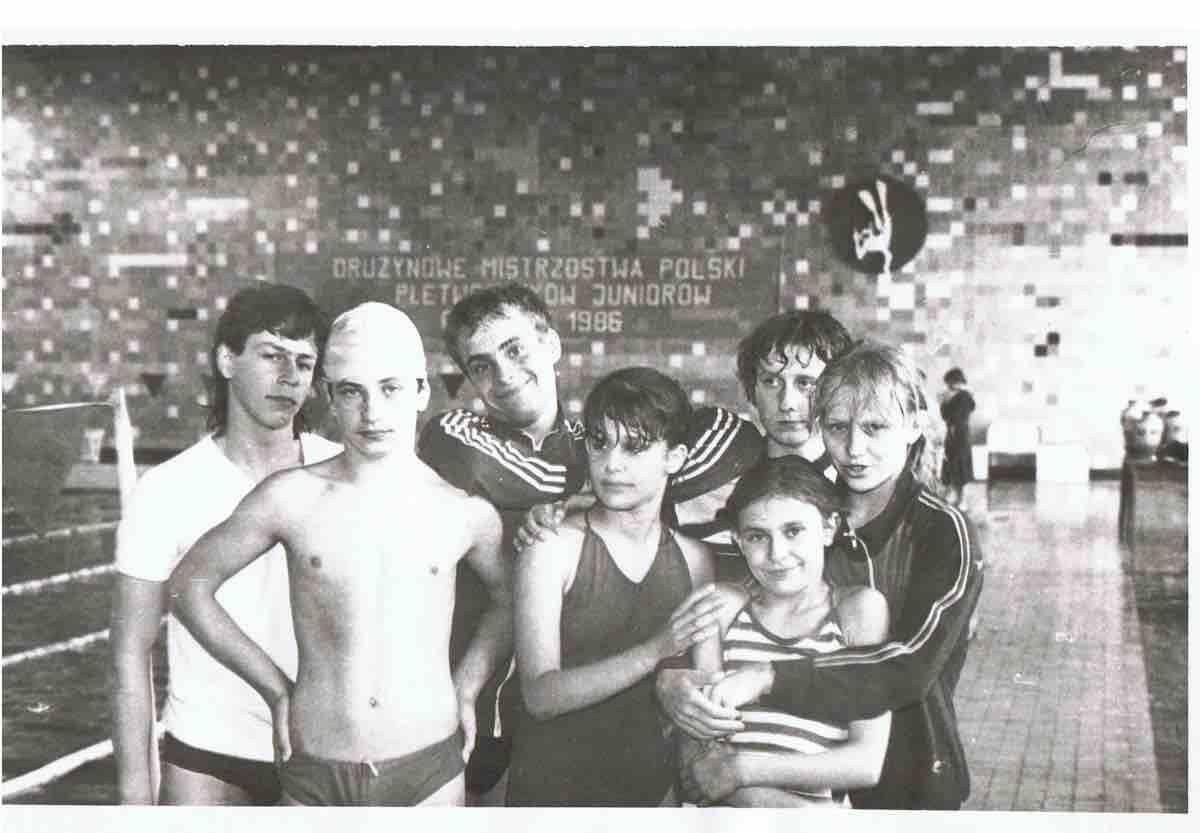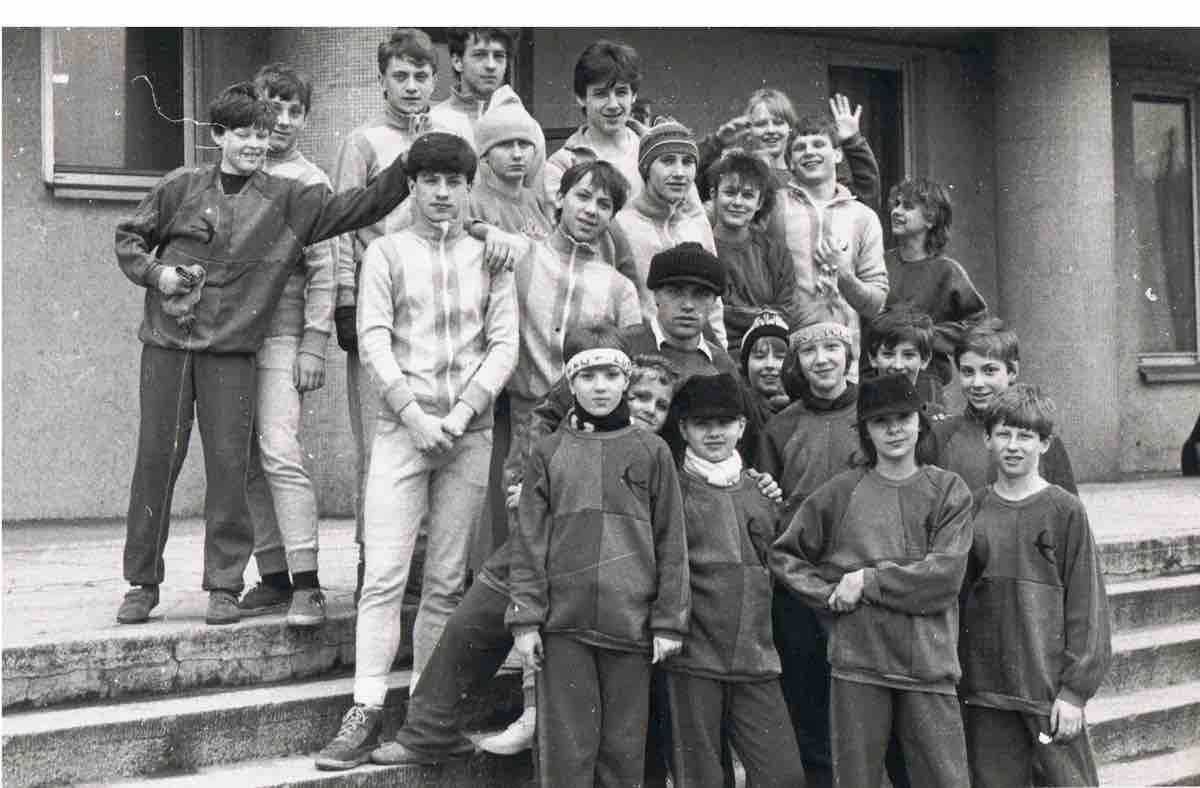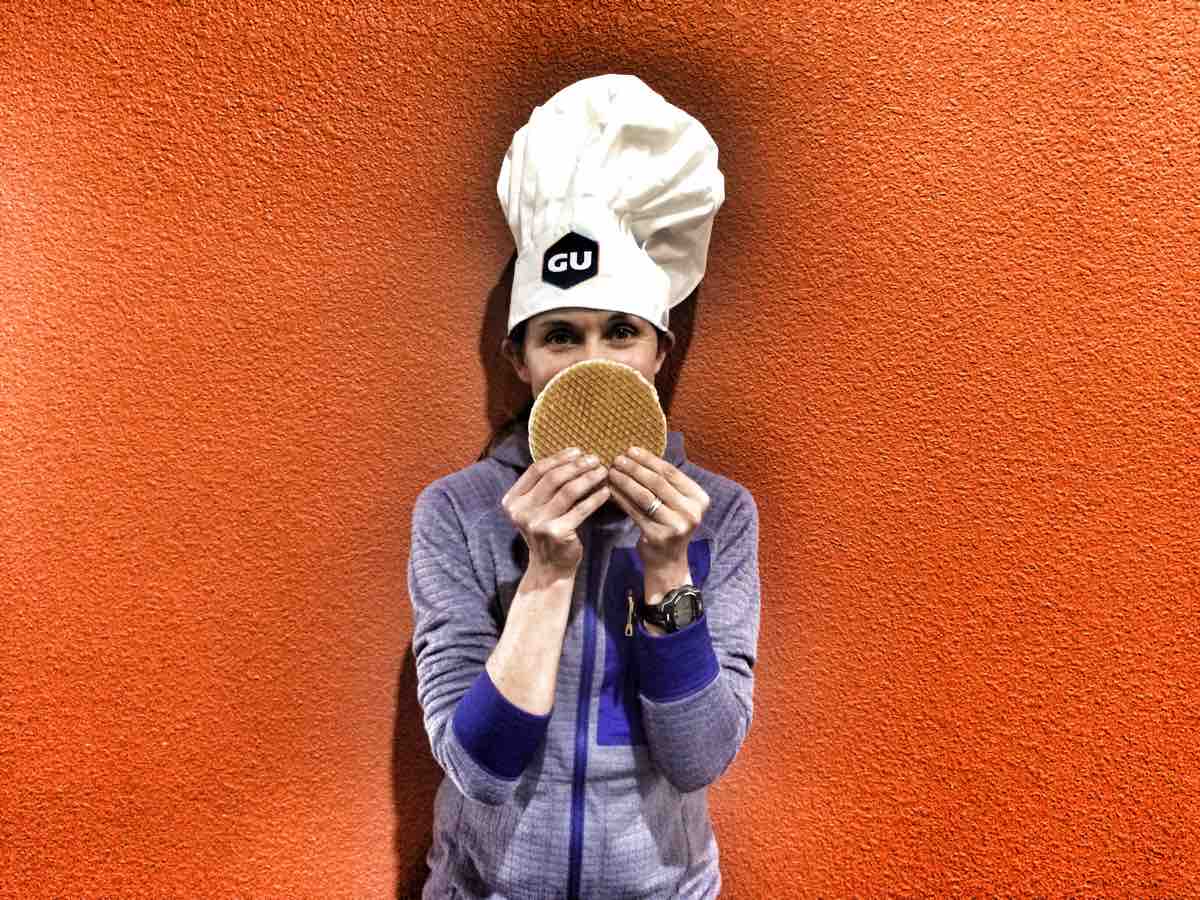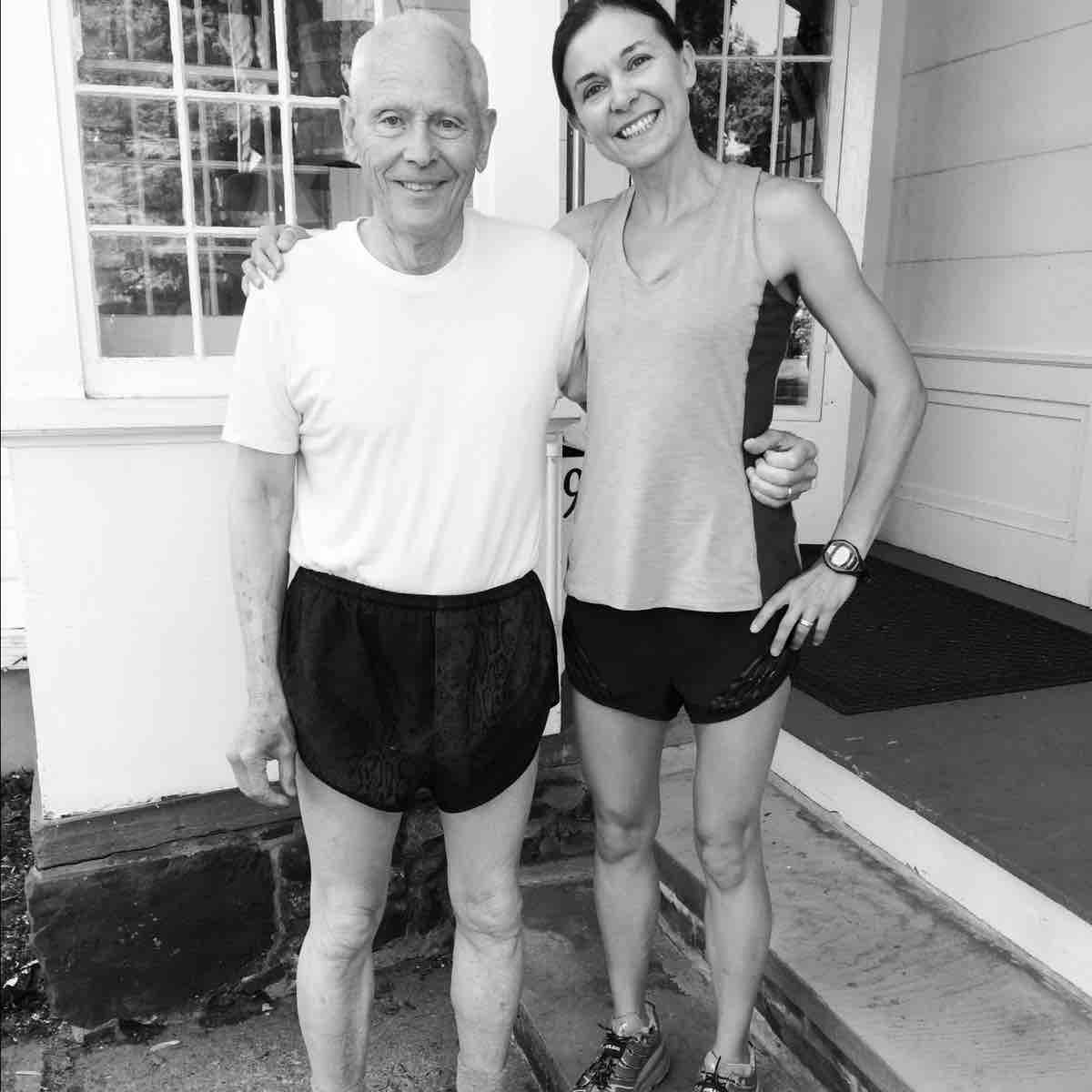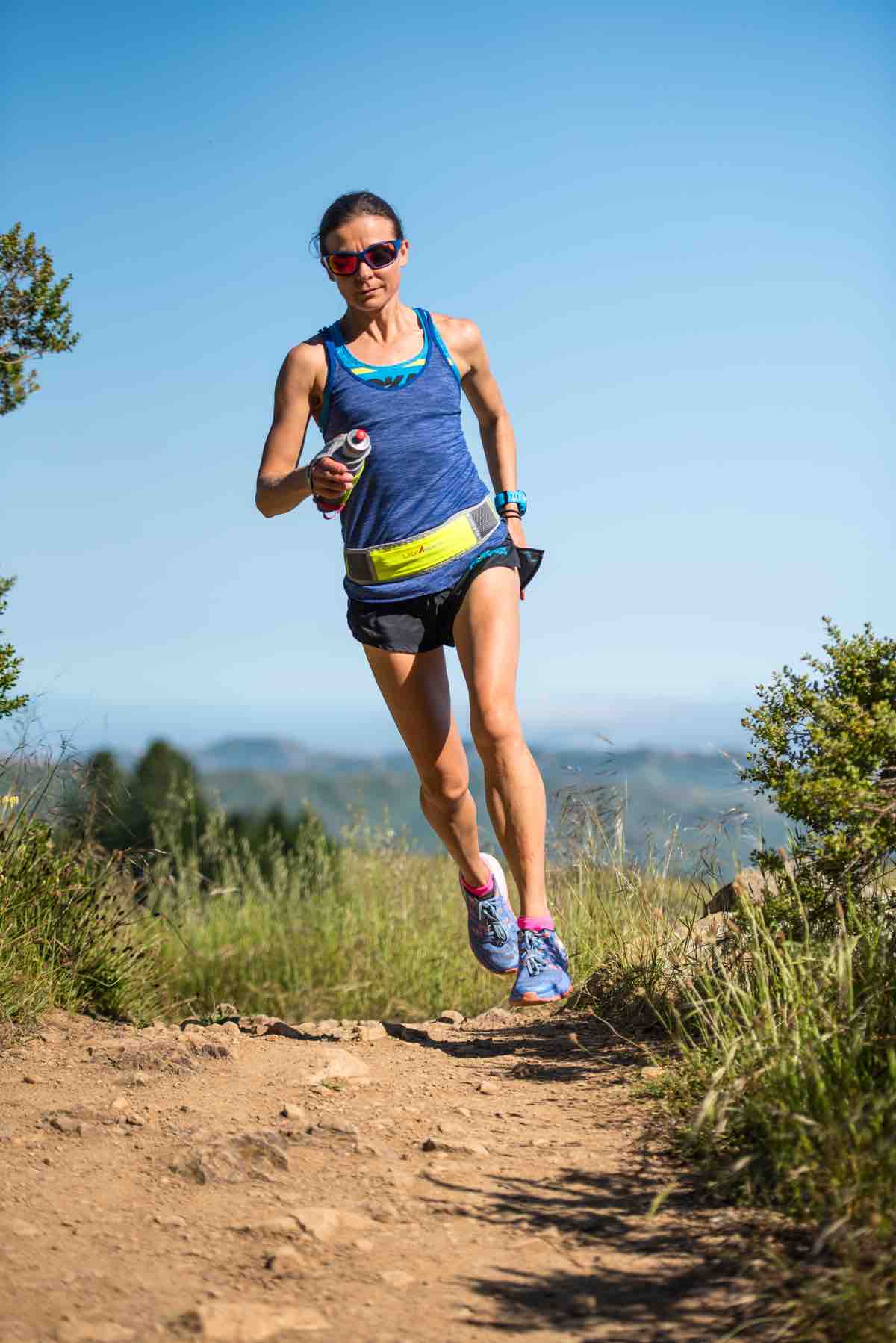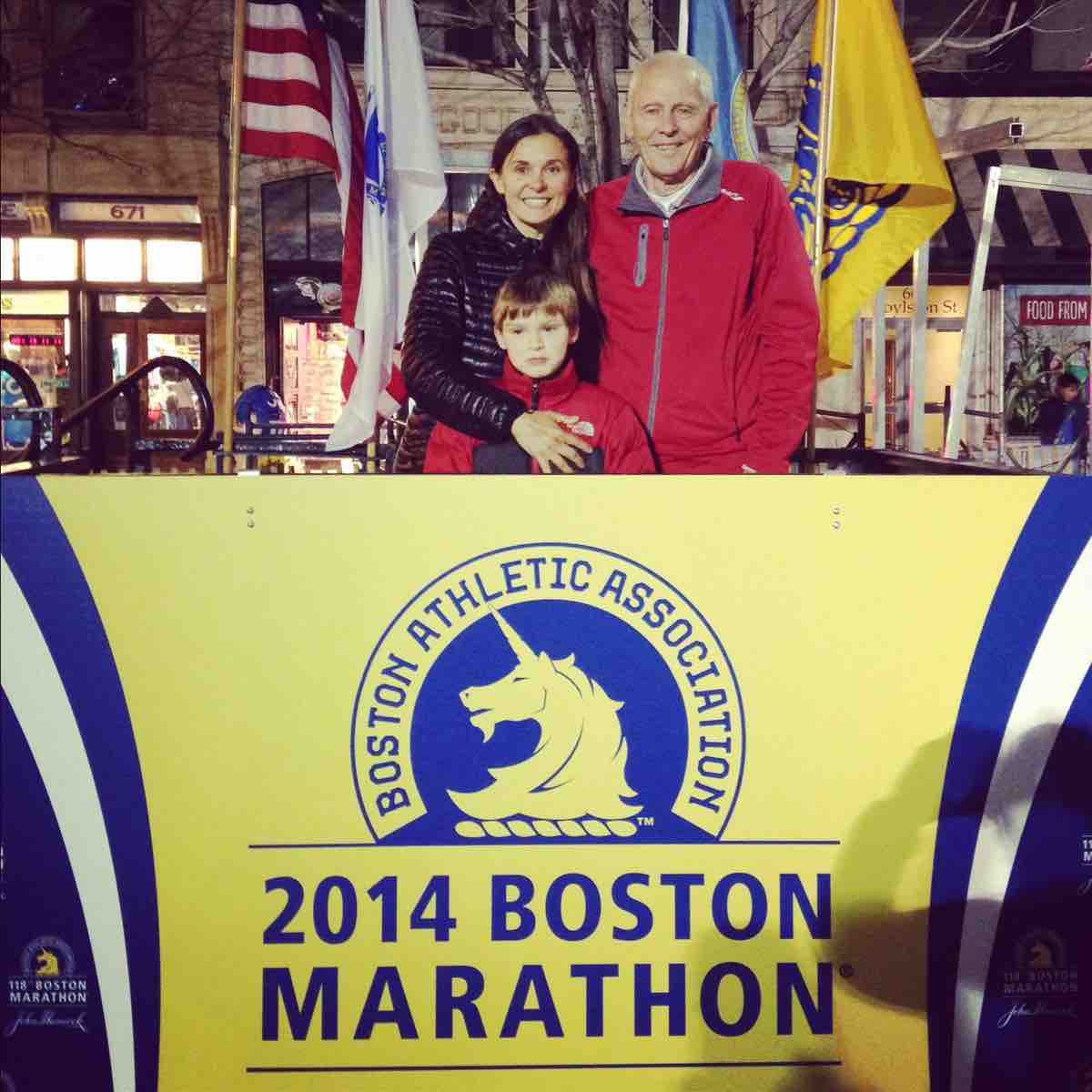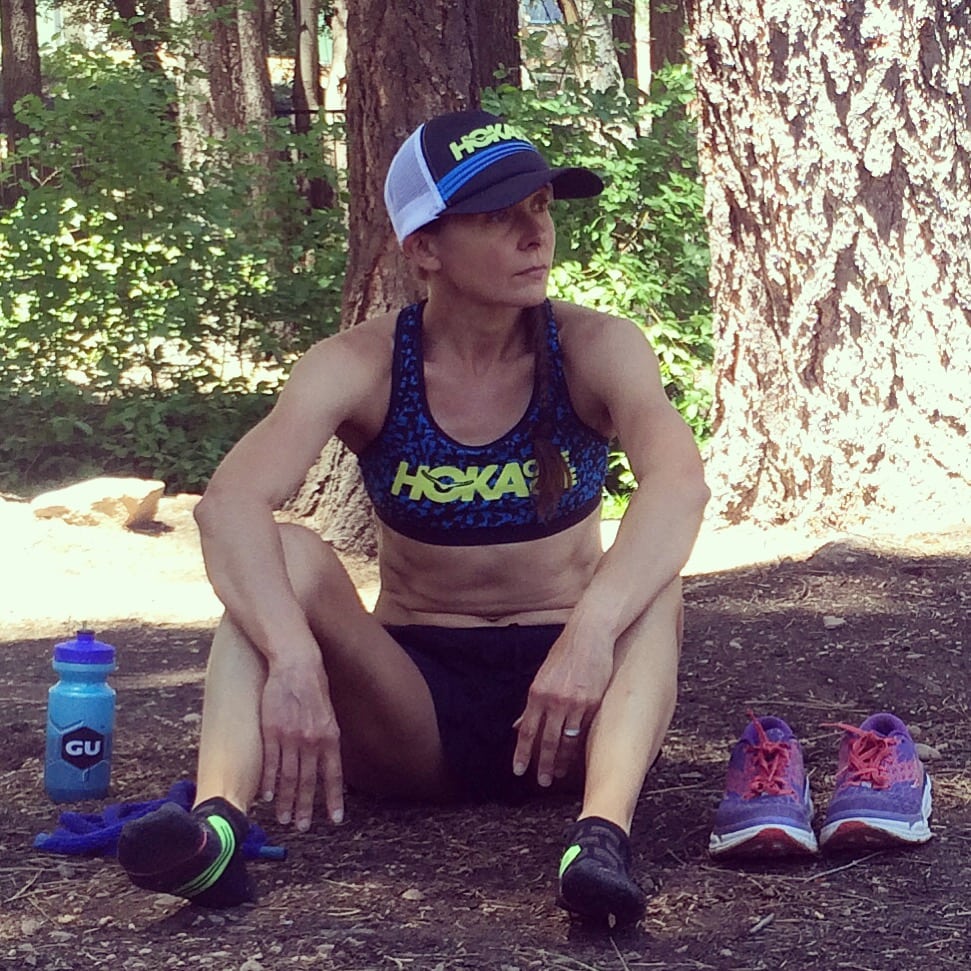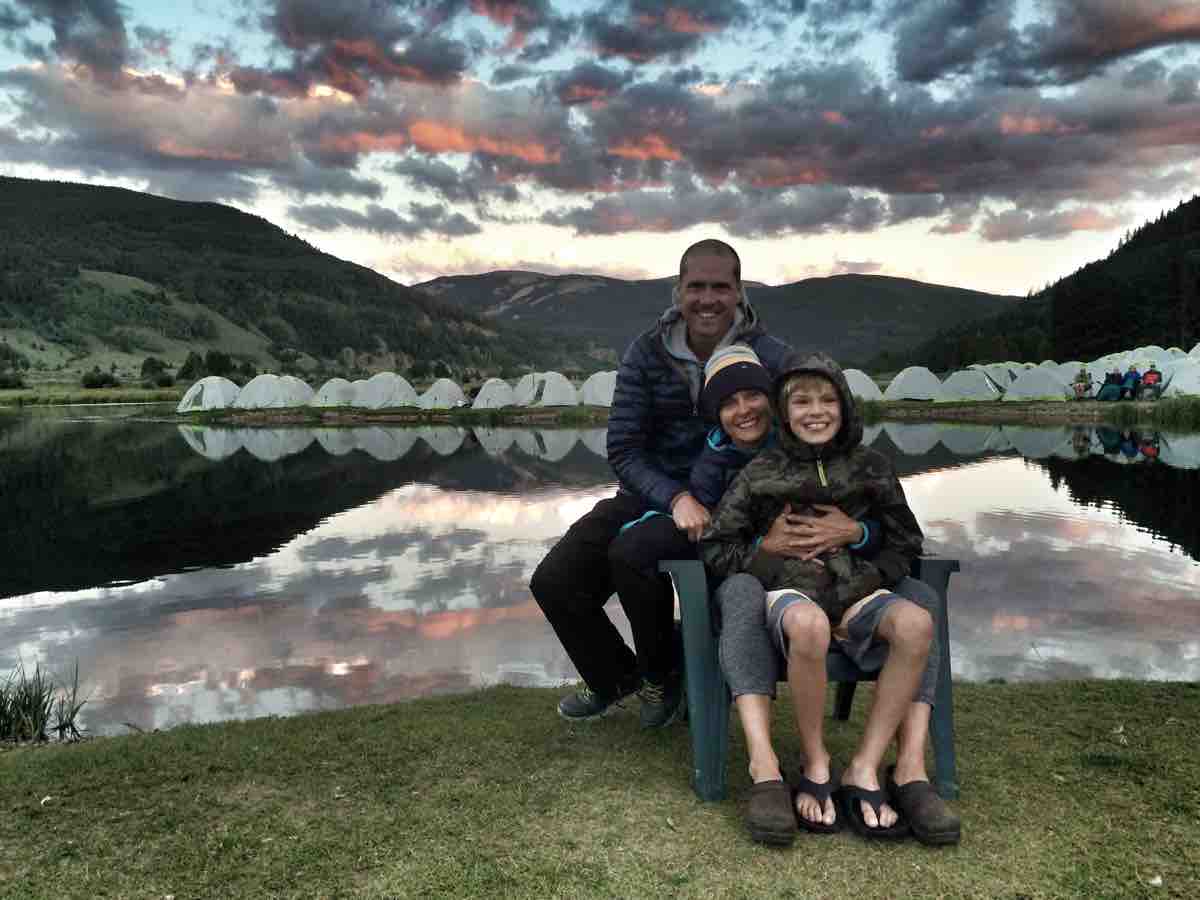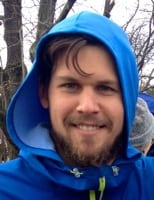America was founded on the principle that anyone—no matter their background or upbringing—can earn prosperity and success when freedom reigns. In one version of The American Dream, life can be better, richer, and fuller through hard work, and each person can achieve according to his or her own ability. If running has its own version of The American Dream, it looks a lot like Magdalena Boulet. An American citizen since 2001, the Polish-born Boulet didn’t stumble upon running until moving to the U.S. toward the end of high school. Years of all-encompassing commitment eventually catapulted Boulet to the sport’s upper echelon when she made the 2008 U.S. Olympic Marathon Team. She’s represented the U.S. multiple times since then, and has most recently taken her talents to trail and ultrarunning. The 2015 winner of the Western States 100, Boulet will return to Western next month to avenge her DNF there due to illness last year.
Put on some red, white, and blue, listen to this audio preview, and then delve into Magda’s life by reading this deeply transparent interview.
iRunFar: I understand that you grew up in Poland.
Magdalena Boulet: Yes, until I was 15, I lived in Poland. Then I lived in Germany for about two-and-a-half years, and that was then 1989. Then I came to the United States.
iRunFar: You speak German then?
Boulet: I grew up speaking Polish. I did learn German. When I went to Germany, I was in high school. Most kids by then were taking a second language, just like I was in Poland, but we were not allowed to choose the second language, we had to take Russian—it was mandatory. Poland was still communist. When I got to Germany, I had to learn German and then also take a second language and most kids were taking English in their fourth or fifth year. So, I had to get really creative and I picked up Latin [laughs] as my second language—that way I could start with kids and not be behind [in learning].
iRunFar: Do you still know any Russian?
Boulet: You know, I do some. I think it’s a very similar language, a Slavic language, despite the alphabet being very different. Honestly, if you don’t use it, you lose it. It’s been a long time, but it would come back pretty quickly if I put some effort into it.
iRunFar: A lot like running, in that way.
Boulet: Right, right. You know it and you don’t use it for a while—I lived in Germany, I learned German, I went to school and wrote papers and essays in German, and suddenly now it’s been over 20 years. You lose it very quickly. But every time I go back, it comes back. I wish I could stay [in Europe] longer [when I go]; it’s such a privilege to know multiple languages but it’s difficult to keep it.
iRunFar: What gets you back to Poland and Europe these days? Races or family?
Boulet: It’s both. I think that I try to take advantage, if there are races in Europe, to go visit my family. Unfortunately, I no longer have grandparents alive—my grandma passed away at 99 [years old] just a few years ago, so I used to go a lot more frequently to visit with her. Now I try to combine the opportunity of racing with travel. My son is 12 [years old] and I try to introduce him to as many family members as possible. It’s an effort because it’s not that close but you always have to take advantage of opportunities.
I was very fortunate to go back [to Poland] and compete at the World Cross Country Championships in 2010 and—I can’t remember what year it was—the World Mountain Running Championships were also in Poland one year and I made that team. So, there have been some cool opportunities that I’ve taken advantage of.
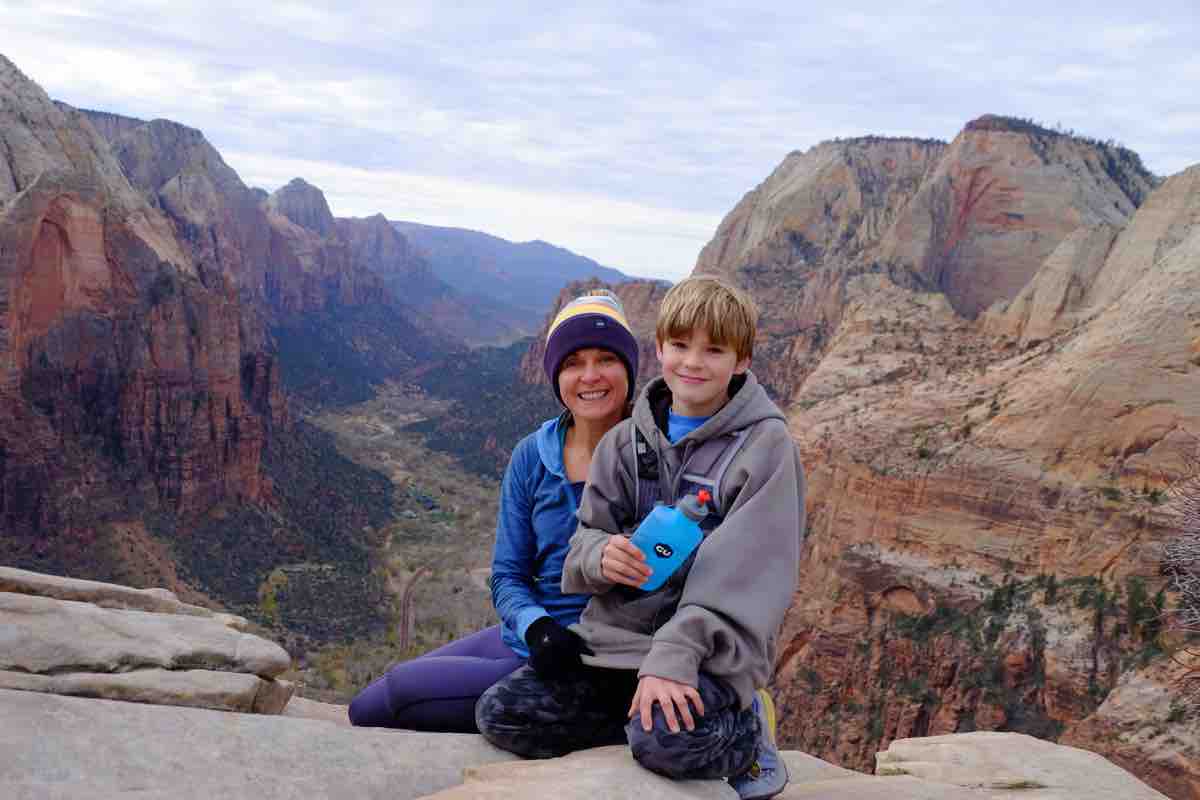
Magda and her son, Owen, pause for a photo at Zion National Park, Utah. All photos courtesy of Magda Boulet unless otherwise noted.
iRunFar: What was it like, for you, growing up in Poland?
Boulet: I grew up in a swimming pool, I like to say. My dad would take me sailing every summer and I pretty much spent my summer on a boat. Then I participated in a swim club. Most of my childhood, when I think about it, I spent in the water. When you’re a swimmer, you practice in the morning, in the afternoon, you spend a lot of time swimming because there’s no pounding, like in running. So just like in cycling, you can spend a lot more time practicing. I have very fond memories of being on teams as a young child.
When I got into swimming, I started eating a lot [laughs]. Those are my fond memories of growing up in Poland. My parents worked a lot. I kind of just, one day, came home and said, “I signed up for swim team,” and that kind of became my life, it was before-school and after-school activity, and summer camps, and competitions. So, a lot of time in the pool. Again, in the summer times, my dad would always take us sailing and spending a month on the boat was a lot of fun.
iRunFar: I was going to ask what got you into endurance sports. It sounds like a lot of it was probably that first experience with swimming—you got used to exercising for a long time.
Boulet: Right. I think that it took me a while to figure out that I was better at running than I was ever at swimming, despite kind of loving that endurance-type of feeling that you get from being a swimmer. And [swimming] teaches you discipline: you have to be diligent to wake up, when you’re on teams, at five or six a.m. before school starts, and double workouts. What got me into running was mostly for social reasons. It wasn’t until I moved to the United States when I was a senior in high school. I made friends with someone on the cross-country team and I thought, Hey, this is the way to meet people. I’m not really a runner but why not go and give it a try [laughs].
iRunFar: And what did you find when you gave running a try?
Boulet: So, yeah, I always go back to that moment because I remember my first run as a senior in high school. I showed up with, like, high-top shoes—whatever the athletic shoes were at that time that I owned. We went on a three-mile run with the team and I found myself just being very competitive—with myself and with people around me, I wanted to be up front, and I wanted to give it my all. Quickly that day, I recognized that I never had that feeling as a swimmer. Despite loving swimming, that competitiveness never came out until that day. Like, Wow! This is kind of cool! I wanted more of it and I never looked back.
iRunFar: There were no semblances of competitiveness within you until you found running?
Boulet: No. Well, I think that I loved swimming and I competed as a swimmer, but you can go through the motions of doing a sport and never have that competitive bug in you, where you want something more out of yourself. Running was the first time I experienced that.
Success definitely didn’t happen right away. It really wasn’t about being better than other people, it was just about being better than what I was before. There were people around me that were better than me and I just really wanted to get better at it. It took me a while—as a senior in high school I made a lot of mistakes. Like a typical high-school runner that went out and tried to run a mile, and ran the first lap 10 or 20 seconds too fast, and struggled to finish the last lap. I made plenty of mistakes, but it never really stopped me from pushing to get better. There was something about running that I craved—to learn, to be a student of the sport. I was never really satisfied; I was always looking to improve.
iRunFar: When you arrived in the U.S., your English wasn’t great, but you ended up working in the window at a Taco Bell. You said about the experience that it “gave you the sense that you could accomplish anything.” I’m curious to hear more about that.
Boulet: [laughs] I think that my senior year in high school, now that I look back, it was tough. I didn’t think of it like that at that time, but it was kind of difficult. I was trying to establish a social circle. There was running, I was still thinking about swimming. At the same time, my parents were in a new environment and I needed to help out and contribute, so I had two jobs. I was going to school and I was trying to complete high school so that I could get into college. I had to take night school, and additional English classes, to get high school finished in time. I got to college maybe a year later than most people [laughs]. Life was a little bit busy, but when you don’t know it, and you’re so caught up in it, you just do it.
I remember when I went to apply to Taco Bell, for that job, I remember I was very grateful, like, “Hey, I have a job! I can contribute to my family.” But it was really scary because when you’re not comfortable, you don’t know what people are saying, and you’re trying to do a good job—and you know you could do a good job, if you spoke the language. So, it was really intimidating. I’m the type of person that always wants to do a good job, no matter what I do. It was a little bit scary. I felt like, years later, that that was probably the best thing that’s happened to me. I learned to appreciate hard work. When you get through something like this, and you make it happen, it makes you feel almost invincible. You did this, and you did this under a lot of pressure, and you had a bunch of other things going on in your life, so how bad can it be next time?
iRunFar: If you were to explain to someone why you run 100 miles, do you think all that—emigrating to the U.S., working multiple jobs, and so on—would be part of the story?
Boulet: Oh, absolutely. I think that having those obstacles when I was in my teens, again, when I was living in that moment, I never really thought about it. It’s when you reflect on it later, when you are mature enough to realize, Hey, that was actually an amazing opportunity to grow and get stronger. A lot of times when things get tough—whether it’s in ultrarunning or something else in life—I do reflect on those moments and go, You got through it before. You can do this again. You kind of learn to step back and leverage that mental strength.
iRunFar: By the time high school finished, how were you as a runner?
Boulet: I was very fortunate to have met the people that I did along the way. One of my teachers told me not to go just anywhere for college, but to really figure out where I wanted to go. I ended up going to a local community college where I naturally joined the track and cross-country teams, at Long Beach City College. I was getting good guidance by then, and my high-school teacher and coach told me that if I continued to pursue running, I could probably get a scholarship and someone would pay for my education. That became a tremendous incentive or me to continue to run. I was a pretty young runner, only one year of running. I liked it, but I didn’t really understand running yet, and the vehicle it could be for me and my future if I continued to pursue it. The free education was a very attractive opportunity.
So, I started running for Long Beach City College. The longer I stayed in the sport, the more I fell in love. I met great people on the team again. I started traveling more to meets. It became a second family and support system. By then I was learning the language a little bit more and I really enjoyed the education. It just started to come together. Now I had a full year and a half behind me, I started to get more consistent, and I really enjoyed the process.
iRunFar: So, the University of California, Berkeley [Cal], where you met your husband, Richie, was the next step?
Boulet: Yeah, we met there. He was running on the men’s team. I was really driven by this free education [laughs]. I definitely was someone that none of the coaches were looking at. I told my Long Beach coach that I wanted to triple at the state meet so people would notice that I had the talent, or drive, or passion for this. I ended up running the 1,500 [meter], 3,000 [meter]—back then women ran the 3,000-meter event—and the 5,000 [meter], all in two days. I remember calling the coach at Cal and saying—I just wanted to let him know. I told him, “I really, really would like to come to Cal.” I had never been to Cal but I was obsessed with it. I knew it was a great school, a great education, amazing professors. I wasn’t looking at it so much as running at Cal, but that running would be my ticket to a great education.
Tony Sandoval, who is the coach at Cal, said, “Hey, why don’t we do a home visit and we’ll talk.” I said, “Yes, awesome!” It was right after the triple, and I think I had finished first in the 1,500, second in the 5,000, and third in the 3,000. I definitely made a little splash in being capable of handling volume. I was not a star in running, but I met the college coach and he came over—and it’s important for the athlete and coach to click—and he looked at me and said, “Kid, I don’t know how good you’re going to be, but you’re pretty tough and I’m going to take a chance on you.” And that’s all it took!
iRunFar: That’s cool. You mentioned the academics being the focus. What did you study at Cal?
Boulet: At first, I thought that I was going to study international business. It sounded really good [laughs]. I thought that I could leverage the fact that I speak different languages, and it being a lot of fun, and I came to Cal and took an exercise-physiology class with Coach Brooks, who is a famous physiologist, and I fell in love with that area of study. I never looked back. “International business—what’s that?” My view changed very quickly [laughs]. I was inspired by understanding the human body in motion and the professor was just such an inspirational lecturer. So, I studied human biology—well, it used to be called human biodynamics. They merged with integrative biology. Yeah, so I spent the next three years at Cal studying with some amazing professors.
iRunFar: When it came to running at Cal, did you start to really improve?
Boulet: I don’t think it was until my junior year that I really understood running. I don’t think I really thought I would run at college. It’s interesting, my last race was NCAAs in the 5k, and I was definitely ready to place and possibly get on the podium but it was going to take a personal best to do that—I definitely needed a new best. The race went really well for me, for the first time, and I did finish, I think second or third. Now I don’t even remember. I think I was second [laughs]. It was in 1997, so I have to look this up. All I remember is that I got a big PR and I felt like I nailed that race really well.
I went up to my coach and said, “I don’t really know what just happened, but this is the beginning of my running. I have a lot more in me. I don’t want to end it here.” He said, “Alright, let’s see what we can figure out.” It felt like that was a bittersweet end to my college career but it opened doors. Inside I knew that I was capable of something more.
iRunFar: Did you continue to work with Tony Sandoval after you graduated?
Boulet: I did. I spent the next couple of years trying to be a 5k runner. Again, I’m post-college, I’m suddenly faced with some tough decisions. I have a degree from Cal, so do I go and get a full-time job or do I pursue this running thing [laughs], which was really scary, and not become a professional in the field that I studied? I decided to work two part-time jobs. I worked in a restaurant as a waitress and I also did some math tutoring with kids, and decided to stay and help on the team and be coached by my college coach. And I struggled, I struggled pretty bad [laughs]. Things were just not working out for two years. I felt like I plateaued and I couldn’t improve my time. I was always on the verge of breaking sub-16 for the 5k but never quite—I couldn’t pull it off and I kept getting really frustrated. I looked at my coach and said, “You know, this company in Berkeley called Gu? I’ve see some other athletes use it. Can we go and talk to the owner of Gu about my nutrition? Maybe I’m missing something and I could feel better.” That was in 1999. We knocked on the door and asked if we could talk about sports nutrition.
iRunFar: What did those conversations sound like in 1999?
Boulet: [laughs] Well, the founder had his Ph.D. from Cal, so instantly there was that connection. He’s very smart, and very passionate about sports nutrition and physiology. Here I am, with a degree in exercise physiology, so we spoke the same language. I was fascinated by how he paid attention to details. One percent matters. One small change here can make a huge difference. I bought into it and started to incorporate different approaches to fueling throughout the day, and fueling for workouts, and recovering better.
Because Gu has been around now, since 1999, they’ve worked with a lot of ultramarathoners. Even back then, they worked with ultramarathoners. I didn’t really understand. You know, Ann Trason comes by to work with you and you hear that she’s won a 100 miler? That’s insane! Very quickly I started to get inspired by the work Gu was doing and I became a research associate at Gu and that was my part-time job and in 2000 I looked at my lifestyle and said, “You know, this training for a 5k is not that much fun. Six a.m. running workouts, and I have to at work at eight or nine. It’s not productive, and it’s not fun. I think I want to try a marathon. [laughs]”
iRunFar: Just like that, you decided on the marathon?
Boulet: Yeah, I think I was surrounded by different crowds. I also figured that I could get up at 6 a.m. and do a 10-mile run, and that’s more specific to a marathon than trying to do quarter-mile repeats, or 800 repeats, at 5k pace, at 6 a.m., when your body is just not going for it. Something about going and doing a 10-mile run seemed very attractive. I didn’t know it back then but I was probably meant to do that a lot sooner.
I don’t think I’ve ever been obsessed with paces. I’ve always enjoyed the long runs. Sundays were always my favorite training day. In college, my now-husband—he was my teammate back then—would always encourage us to get outside of Berkeley and go to Marin and do long runs on the trails, because that’s where he grew up. It quickly became my favorite day of the week. I looked forward to running with the guys in Marin. I would always tag along. Pace was never something that I chased, it kind of just happened.
I’ve always felt like I was very coachable. Later in life, when I got into the marathon, I always challenged my coach, “Can I handle more?” In terms of paces, I always stay with what’s given to me. I’ve had very good, long-term relationships with my coaches. I don’t jump from coach to coach, I believe in building on success and staying with the same system and making it better. When I started doing marathons, I started working with Jack Daniels. We worked all the way until I was ready to move on from that and it was a good 12 years. He took someone that on paper—you know, I wouldn’t have bet any money on myself [laughs]–to make an Olympic Team.
iRunFar: What turned your career around following some struggles at the 5k distance?
Boulet: I started consulting with Dr. Vaughan at Gu, but very quickly after that I started working at Gu part time. Being surrounded by the endurance community at Gu, I realized that maybe I should try a marathon, maybe I would be much better. You always think, Wow, I’ve been running pretty fast. What if I just go slower for a little bit longer? That doesn’t sound that bad [laughs]. There was something about the distance that kept pulling me toward it. I started thinking about how I love my long runs, I love my workouts, there’s a reason I love it, maybe I should give it a try. I had never raced anything longer than a 5k. In 2000, I had never even done a 10k on the road or the track. It was a conscious decision to give it a go. Most of all, the training fit better with my lifestyle and that was definitely the deciding point. You know, I could train in the morning, go to work, working throughout the day was not affecting my running, I could do long runs, which I loved, on the weekends, and very quickly I started gaining some consistency in my training. Eventually, that led to improvement.
iRunFar: It’s interesting that years later, in 2011, you finally did run your sub-16 5k—you ran 15:14, actually—and that was a decade after training for marathons.
Boulet: Yeah, a decade after, and it was basically the next time [after going to the marathon] that I ran a 5k. It’s a comical story. I wanted to run a 5k, and my agent at that time called me up and said, “There’s a 5k in Stockholm, which is a Grand Prix meet.” And I said, “I’ll take it, I’ll take any opportunity, I’m ready to run fast.” When they listed everyone’s PR, it was like “14:27, 14:30, 14:44, Magda Boulet…16:04 [laughs].” I just laughed. I knew I belonged but on paper it looked really funny.
And I think the success at the 5k at that time was absolutely a result of the consistency I had in training while running marathons. I think the stronger I became in the marathon, the stronger I became in the shorter distances. My coach never really neglected the speed work during training for the marathon. He always would let me know, based on my marathon strength and the workouts we were doing, what I was capable of in the 5k. All it takes is to get more and more specific, and if it’s part of the plan for the season, you can make a few changes, but the strength was there.
iRunFar: What about making the 2008 Olympic Team—what was that like for you?
Boulet: I chased making that team for so long. The goal was so important to me. I came so close in 2004. You know, it becomes your world, you live it every day. You live it, you breathe it every day. Everything you do, it has a purpose—from how much, and what, you eat, what time of day you choose to do your workouts, so that you get the most out of that session. You know, you try to balance—I still had family at that time. But everything I did had a purpose toward that one goal: to toe the line in the best shape of my life and be ready to perform on that day.
It’s never guaranteed. You could have the best race of your life and you might still not make the Olympic Team. But I knew that I wanted to show up to that race in 2008 and just leave it all on the line, and walk away knowing that, not only did I train hard, but also I was able to run the smartest race for myself, and put myself in a position to run at my optimal.
There are a lot of times when you run very strategic. Races, sometimes you try just to win, you aren’t running the best time or what you’re capable of. I knew, in 2008, that that was my only chance. That’s how I felt. I need to make this happen on this day and I need to be smart. I don’t want to take any risks on this day. It was about running the time that I thought I could, which then was about 2:30.
iRunFar: Not getting consumed with the race and sticking to a plan and a time—that sounds a lot like running an ultra.
Boulet: Yeah, I think something just clicked for me that year. Everything my coach was trying to teach me, I finally put it all together. I realized that he was totally right—just because you feel really good and are in really good shape, sometimes the most important races are the ones where you don’t want to take risks, you want to stay according to the plan.
In ultras now, I know my limit and I know what I’m capable of. In certain races, I’ll go outside of that zone and see what happens because it’s a learning opportunity. But I’m not going to do that at Western States, I’m not going to do that at [UTMB]. I’m going to do that at a local race where I give myself permission to play and take risks.
iRunFar: Your son, Owen, is 12 years old. You’ve mentioned that was sort of a turning point in your life. That’s also the time you really started to blossom as a marathoner. Was that timing accidental, or was there some sort of causal link?
Boulet: I think that’s a couple of things. You know, I stuck in the sport long enough to gain the benefits of all the work I’ve done over the years. I think that’s a big one. I never, never gave up. As a professional runner, you have more low points than high points. A lot of people, I think, in our country, walk away with frustration because of—it’s not fun to be on the sidelines. But those moments do pass. You have to believe that what you’re doing is the right thing.
When Owen was born, that was an additional motivation for me to really do it right and do it with purpose, and no longer just do it for myself. It went from just, like I said, living and breathing it, for that one goal I set for myself, to now, I had a greater purpose. I wanted to be someone he looks up to. One day—he’s still kind of young to understand—one day maybe he’ll think of his mom as someone who worked really hard toward this one goal. I hope that it inspires him. I hope that when he wakes up in the morning and I come back from my training, one day he’s going to realize that that’s pretty rad—his mom worked her butt off to do what she did. It definitely became something that was greater than me. I always feel that that type of inspiration is always more powerful than just setting a goal for yourself.
iRunFar: What has it meant for you to be able to represent the United States in competition?
Boulet: Wow, that’s a heavy question [laughs]. I get a sense of representing something bigger than myself. You know, in college, you put that uniform on, you represent your team and your school. I kind of got a taste of that. You wear that uniform with tremendous pride. It really wasn’t until the day where I became a U.S. citizen in 2001 that suddenly, in the future, making the teams, putting on the singlet, was possible. So many feelings, tremendous feelings. I’m grateful. I’m grateful for all the opportunities that were given to me, that my parents took that step to move [to the United States], which gave me an opportunity to chase my dreams. I often think about what my life would have been like if my parents never made the move to come here. It’s heavy. Not only am I proud, grateful, but… [pause] it’s full of feelings. My heart is very fulfilled.
iRunFar: After such a successful marathon career, why did you decide to start running ultras?
Boulet: [pause] Again, my motivation continues to be the same. I love exploring new places around the world and meeting new people. There is no better way than doing it through running. I love to run and I love to compete. I see myself doing it for the rest of my life. But it’s even more fun when you get to compete in some really challenging, yet beautiful, places around the world. When you actually ‘get’ ultrarunning, I think that’s definitely something we all have in common.
iRunFar: Certainly, you’re looking to win Western this year. Is that the goal?
Boulet: If you asked me that before last year, I would say, “Yeah, of course! The goal is to go out and win.” But I had a really humbling experience last year. For me, really, I just want to make sure I get to that finish line. I want to show up and not get sick the week before, or have any hurdles that I need to deal with. I just want to get to the race healthy—and I’m healthy, which is great—and do what I’m capable of.
Winning is always in the back of my mind. It’s something that I’m training toward. But I know that when the gun goes off, I want to have a good experience. It is so different than a marathon; it’s such a longer race that if things don’t go well, you’re out there for a long, long time, not having a good time. And, yeah, I don’t want to sign up for that [laughs]. I want to go out and have a good day. I can’t really control other people, but of course I’m going to be competing to get back on that podium and try to win the race. But the priority is to go out and have a good race, a good experience. My first Western States, I was on cloud 9 despite having normal hurdles that I had to overcome during the race. Last year, it was just hard. When you get a stomach bug the week of the race, you just know that you probably shouldn’t start the race. You make that mistake and you toe the line—it’s not fun. It’s not fun when you’ve been working toward it and it’s escaping in front of you.
By far, the most important thing is just to have a good race. I don’t mind obstacles. I just want to show up and feel great and however it goes, I want to make a good race. But I want to be able to control certain things. Certain things like getting sick, you can’t control, and that’s the frustrating part. I want to control the control-ables.
iRunFar: If you had to bet on the 2015 Western States Magda or the 2017 Western States Magda, who would you bet on?
Boulet: [laughs] I would definitely bet on 2017 Magda. I have a lot more experience. I already have two 100 milers under my belt, which is a lot more than in 2015. I have done a lot more specific work. I know what I’m getting myself into. I felt like I was really clueless going into 2015, which sometimes that’s a good thing [laughs]. I definitely feel that I’m a lot more experienced. I know how to handle the difficult parts of the race that I know will happen no matter what, but I’m prepared for it. Before, I was still learning as I was running [Western].
iRunFar: I can’t help but think of your life as The American Dream.
Boulet: I think so. What is the definition of The American Dream? Depending who you ask, it might be owning a house and having a great job. For me, those things don’t really matter to me as much as having the opportunity and being able to have opportunities in front of you and know that if you have a desire to chase something, it’s out there and the world is yours. I do feel like, in a way, I have found that.
I think about my entry to college. That was an opportunity that someone just mentioned to me. What?! I can run hard enough and someone will pay for my education? The fact that that was out there and I was able to go chase it was incredible. It’s examples like that, time after time, with jobs, or the fact that only top-three women in the United States go to the Olympics [for a given distance], and it’s up to you. What do you do to get there? It’s fair game on that day. On paper, I probably shouldn’t have made the Olympic Team but because of our system and how we do it, you have this opportunity. So, yeah, I’m constantly reminded that I live [The American Dream]. I live in a tiny home because I love tiny things. I put more emphasize on travel, food, and family, instead of things. It’s my dream.
Call for Comments (from Meghan)
Time to share your Magda Boulet stories! Have you run or raced on the track, roads, or trails with her? Have you seen her living out her version of the American dream? Leave a comment to share your thoughts about Magda.

